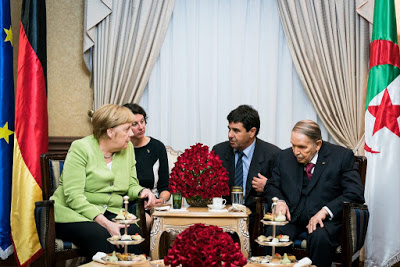Germany, Algeria Seek Ways to Speed Up Deportations
 |
| MT – September 18, 2018 |
Algeria’s prime minister, Ahmed Ouyahia told the visiting Germany chancellor Angela Merkel his country would take back all its citizens illegally residing in the European nation.
Merkel, who is making her second visit to Africa in two months, said the two countries need to find ways to speed up the repatriation of Algerians living illegally in Germany.
“We talked about how to make more efficient that those who have no right to stay will be returned,” Merkel said during her one-day visit.
I confirm that Algeria will bring its citizens back, whether it’s a matter of 3,000 or 5,000 people.
Since around a million asylum seekers reached Germany in 2015, Merkel’s government has been pushing for ways to speed up the process of sending home those whose applications are denied.
Ouyahia said most citizens had been returned on Air Algerie flights, adding the process could be speedier if Berlin was able to convince Lufthansa to fly them back on its regular flights.
“I confirm that Algeria will bring its citizens back, whether it’s a matter of 3,000 or 5,000 (people),” the premier said during a news conference alongside Merkel.
German authorities say nearly 3,700 Algerians are eligible for deportation, and Ouyahia said 700 of those cases were already being processed.
Germany seeks immigration solutions
Merkel affirmed the “will in Germany to welcome those who have good reasons to flee their countries,” such as Iraqis and Syrians, offering them the right to stay and work.
“On the other hand, where the right to remain does not exist we expect that the state can take action.
“To that end, we need partners who are in agreement with us and Algeria is one of those partners,” Merkel said.
Germany wants to declare Algeria, like Tunisia and Morocco, a safe country of origin, which would make it easier to deport asylum seekers from there. Less than 2 percent of Algerian asylum applicants in Germany receive protected status.
Algeria’s own immigration challenges
Ouyahia said the Algerian authorities were also taking action against those illegally entering its territory.
“Algeria does battle for the rest of the international community,” he said, by preventing “20,000 to 30,000 people annually from entering Algeria illegally” from where many continue their journeys to Europe.
Algiers has meanwhile asked Berlin to implement extradition requests issued by Algerian courts.
Beyond immigration
Merkel, who departed Algeria later on Monday, also met with the country’s ailingpresident, 81-year-old Abdelaziz Bouteflika during her official visit.
As well as migration, economic issues and terrorism were also on the agenda, according to official Algerian Press Service.
“We wish… to contribute to the diversification of the Algerian economy” hit hard by low oil prices, Merkel said.
She also said Germany was willing to continue its “close cooperation” with Algeria in defence and security, particularly for “the fight against terrorism and internal security”.


